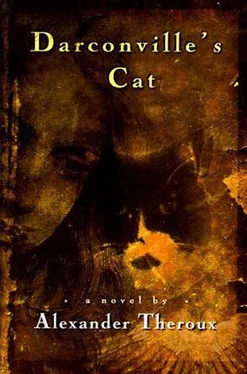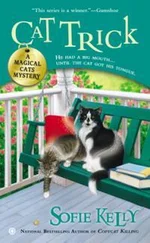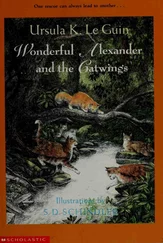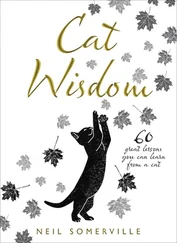Darconville, unwittingly, backed into a group of old ladies. It was the delegation, each old enough to carbon-date, from home economics. In the midst of them, studiously arranged that way, loomed a huge unproliferative boffa with tied oviducts and blimp-like breasts which sagged according to the law of S=½vt2 named Mrs. DeCrow, associate professor in American history and local U.D.C. chairwoman, who was blowing a loud ranz des vaches across the room, subject: her summer in Biloxi. She had a voice like a faulty drain. There was a cruel pin in her hat, and she wore an eighteenth-century brooch with a painting of a litter of pigs on it. Famously disagreeable, at least so Dr. Dodypol, a colleague, told Darconville, she harbored a monomaniacal loathing — something not a few Southerners shared — for Abraham Lincoln.
“I know you but you don’t know me,” Mrs. DeCrow announced to Darconville, hoping she was wrong.
An arrangement, thought Darconville, that suits me fine.
“Wait,” she suddenly exclaimed, holding a finger to her nose and turning to the other ladies, “but now who does this boy remind me of?”
Everyone dutifully waited.
“Not that awful Edwin Albert Poe who wrote horror poetry?” asked a sagcheeked lady cretinously mis-shoving a wedge of cake into her face.
“No,” said bossy Mrs. DeCrow, cocking a quick snook at the lady. “I know,” she said, interrupting herself, “Sir Thomas More.”
“Saint Thomas More,” corrected Darconville, for whom such distinctions meant something. But he was smiling.
Mrs. DeCrow, arching an eyebrow, didn’t care. That remark, though she smiled a hard smile, immediately cost him — and irrevocably — any invitation whatsoever to one of her Fridays, even if he lived to be a hundred. She knew where to stick the knife in.
Darconville submitted to his uneasiness and in the contending noise, the rambling incoherent flow of talk, found that the most delectable social delight there seemed to be the quarrel that stopped just short of violence, discussions ending in repeated barks and loud flat interrobangs. It was a tragedy of language. There was no dialogue, only monologue, wherein each of the thimbleriggers and pathologically self-defensive opsimaths gathered there, most of them educated on the fly at one of those narrow and sectarian chop-and-chance-it swot factories in that region which was named after some square-capped fifteenth-century Protestant joykiller, only kept to a mad and self-referent fixity of subject and blathered on to no consequence.
Suddenly, there was a buzz of intrigue by the doorway: someone reporting a car accident. Xystine Chappelle, calling from the Quinsyburg Hospital, had reported that, while driving them home, Miss Shepe and Miss Ghote, sitting in the back seat, had willfully resumed their “I-think-that-you-think-that-I-think” argument, whereupon Miss Ghote leaped in frustration from the moving car and broke her femur.
“Them ol’ beangooses,” muttered Dr. Glibbery, fingering through the candies, “I do believe they gone get married one day.”
“Are you?” Darconville, surprised, looked behind him. “Are you married?” It was the German instructor, Miss Tavistock (a.k.a. “The Clawhammer”), a flat-chested girl with a cataleptic smile who had the curious habit of suggesting to perfect strangers that, frankly, she thought they were in love with her.
“No, I’m not,” answered Darconville who, suddenly noticing Mrs. DeCrow empty-handed, offered her some cookies, but she would have none of it and walked past him in a snit — the snit that would last a lifetime.
“The writer,” sighed Miss Sally Bull Sweetshrub, the tournure of her phrases as precise as cut glass, “has no time whatsoever for such things as marriage. No, I’m afraid she has not. The devotion which asks her to feel the deliberation of art asks also that she choose the single life.” A senior member of the creative writing department, Miss Sweetshrub carefully lifted off her half-glasses and, patronizingly turning her head from person to person, lectured the few people nearby on the difficulty in question. She was — how to put it? — an “unclaimed blessing.” “I am a novelist, you see,” she said, “which is spelled d-e-v-o-t-i-o-n.”
“I see,” said Mrs. McAwaddle, the registrar, who passing by with a tidy of licorice-whips on a napkin and a paper cup of purple soda unintentionally got hooped into the conversation.
“But do you? Do you really?” asked Miss Sweetshrub.
Mrs. McAwaddle, to be kind, gave the mandatory sign of ignorance by pretending to reconsider and said, “Mmmmmmm.” Long having been a fretful auditor to Miss Sweetshrub’s explicit polysemantic chats, she knew the hopelessness of trying to extricate herself. “Well,” she reflected, charitably, “I have no doubt but that I might not.”
Prof. Wratschewe, ducking his head in, interjected. “Excuse me, Mrs. McAwaddle? The word ‘but,’ I believe, is used unnecessarily after the verbs ‘to doubt’ and ‘to help.’ Strunk & White, Book Four, I think you’ll find.”
“I wouldn’t have made that mistake,” riposted Miss Sally Bull Sweetshrub, bowing her head and fluttering her eyelids with the advantage Prof. Wratschewe’s old, but as yet inconsequential, crush on her allowed.
Miss Sally Bull Sweetshrub, aet . 50 or so, was classically affected and wore out-of-date dresses that looked like Morris wallpaper. She had a perched Jacobean nose, like a dogvane, a waltzing oversized bottom, and wore her pissburnt-colored hair in an outlandish bun at the back anchored by several severe combs that matched in horn her conversational brooches. A bottomless fund of clarifications and cruelly sharpened pencils, she was known for giving strawberry teas and answering all her mail on Featherweight Antique Wove, Double Royal 90 when she couldn’t attend a function, which, of course, she always could — and, when so doing, always did in the company of her pet beagle, “Howlet,” and a monstrous alligator friend who some years ago left its native land in the form of a handbag. She was the pillar of Quinsy College, a woman both impregnable and unbearable (what she might have borne were she pregnable would, indeed, be unimaginable!) — one of those starboard-leaning High Anglicans, famous and innumerable in the Old Dominion, whose factitious sense of vanity in a private conversation makes it frankly public: the raised and punishingly assertive voice of the insane queen which includes, willingly or not, everybody within earshot.
“You perhaps know my work?”
She was looking at Darconville with her eyes shut, her lavender gloves buttoned shut and crossed immaculately in her lap.
“Possibly. Could you name—?”
“My novels? Let me see. My first was Answer Came There None , then, respectively, I, a Stranger; Also but Not Yet the Wombat Cries; The Big Regret; The Interrupted Woman; The Same, Only Different ; and The Black Duchess .” It was the genre of course of Hoodoo, Hackwork, and Hyperesthesia, the popular dustjacket for which always showed a crumbling old mansion-by-moonlight and a frightened beauty in gossamer standing before it, tresses down, never knowing which way to turn.
Darconville, listening in spite of himself, was trying to repress an image of the prattling angel, Glossopetra, who reputedly had fallen from heaven to spend his eternal punishment wagging like a human tongue.
“There was a volume of my early verse, Naps Upon Parnassus . I followed that,” continued Miss Sweetshrub, “with a critical work on Robert Browning called The Snail on the Thorn .” Miss Throwswitch, standing behind her, periscoped two little fingers over her head and wiggled them, while Mr. Schrecklichkeit and Qwert Yui Op smiled into their sleeves.
Читать дальше












